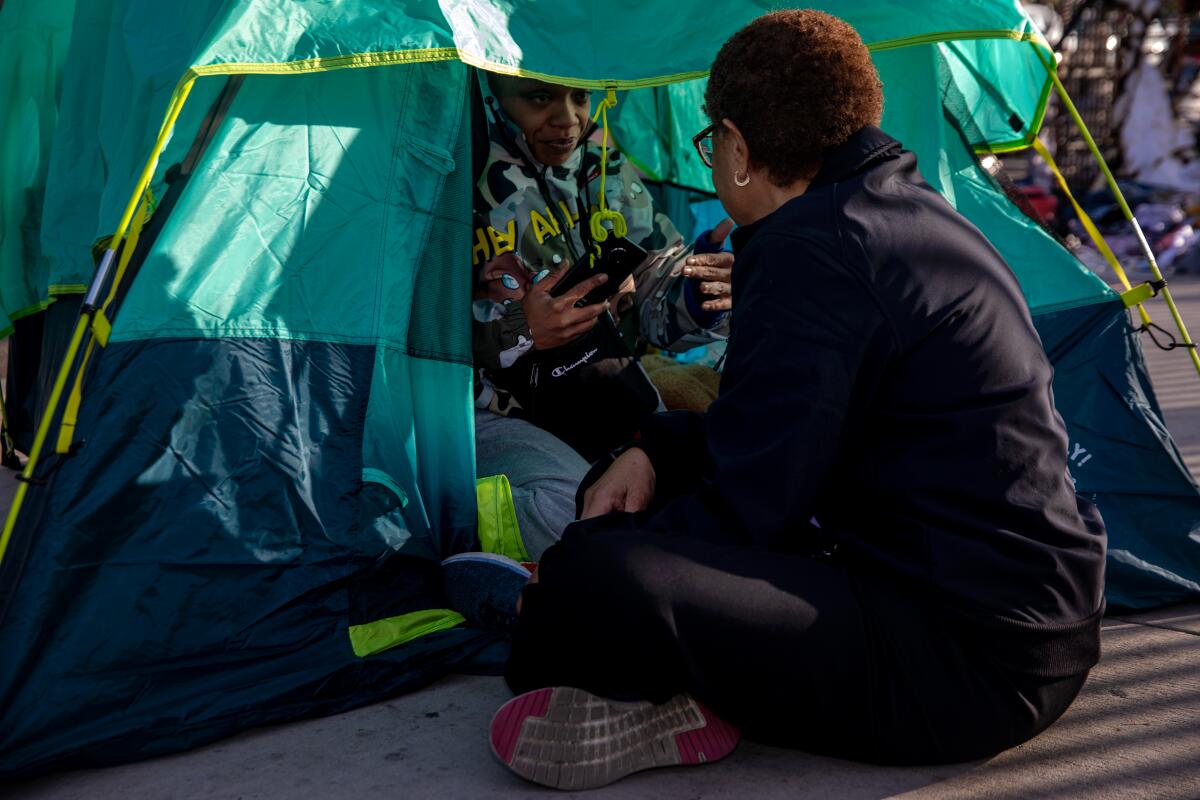Editorial: Asking the Supreme Court to weigh in on homeless policy invites troubles for L.A. and other cities

There are many ways for local governments to reduce homelessness — primarily building new housing, providing mental health or substance use services and adopting policies that prevent people from becoming homeless in the first place. Citing and arresting homeless people camped on sidewalks, however, is not one of them. Nor is whining to the Supreme Court that judges won’t let cities cite or arrest homeless people.
Yet Gov. Gavin Newsom, officials from several cities — including L.A. City Atty. Hydee Feldstein Soto — community groups and various jurisdictions across the West have filed briefs asking the Supreme Court to overturn appellate court rulings that they say either limit their ability to enforce anti-camping regulations or don’t offer enough guidance on how to do it.
The 9th Circuit Court of Appeals, in 2018 and 2019, mostly overturned a federal court decision in Martin vs. City of Boise and ruled that it’s a violation of 8th Amendment rights prohibiting cruel and unusual punishment to criminalize people for sleeping outside anywhere — or without the availability of an alternative such as an adequate shelter bed or other interim housing.
The 9th Circuit’s 2023 decision in the case of the City of Grants Pass, Oregon vs. Gloria Johnson extended the reach of the Boise decision to civil citations that can escalate with repeated offenses into criminal penalties. In both these decisions, there are exceptions: Cities can declare some areas off-limits to camping, just not all areas. And they can enforce those rules if adequate shelter is available for the people living in the targeted encampments.
You’d think that the 9th Circuit had told cities they had to keep homeless camps on sidewalks permanently. City and state officials complained that their hands are tied in their efforts to keep their streets clean and implored the Supreme Court to hear the case. (The amicus briefs are in support of a petition by the city of Grants Pass requesting the Supreme Court take up the case.)
They claim to be confused and in need of clarification: For example, “does allowing people to sleep on sidewalks because they have nowhere else to go extend to urination and defecation in public or open flame cooking in public?” asked Feldstein Soto in her brief. (In fact, the city of L.A. has already said it won’t enforce ordinances against public urination against homeless people.)
Even as Newsom and Feldstein Soto in their separate briefs said they supported the underlying decision against criminalizing homelessness, they worry that if the high court lets the decision stand, it could increase public safety risks. Feldstein Soto warned in her briefing that if the high court let the decisions stand, “a real risk of lawlessness, illness, and threats to public health and safety exists, to the detriment of unhoused and housed residents alike.”
Feldstein Soto decided to file that brief on her own, but that does not necessarily reflect the opinion of other city officials. (The City Council never took a vote on whether to weigh in on the decision.) Mayor Karen Bass, who has smartly focused her attention on getting homeless people off sidewalks by offering them housing, is unequivocally opposed, saying in a statement: “I do not support the Supreme Court hearing an appeal of the Grants Pass decision to potentially issue a ruling that could embolden those who wish to criminalize unhoused Angelenos.”
And that is precisely the risk if the Supreme Court takes this case and overturns both of these important decisions. The court is not going to take this opportunity to do a Q and A on whether cooking over an open flame is permitted. That’s not the level of nuance the court will get into.
It’s a bad idea to invite the Supreme Court to weigh in on homelessness policy, and it isn’t even necessary. Current rulings do not stop city and state officials from getting homeless people out of encampments, or from providing the temporary and permanent housing and services that are the only way to reduce homelessness. They also don’t block limited enforcement as long as there are some places that homeless people can sleep outside or some available shelter for at least some homeless people.
In Los Angeles, homeless people already are barred from camping in front of schools, day-care centers, parks and other areas designated by council members. They are prohibited from sleeping in vehicles overnight on some streets. Instead of complaining about not having enough ways to force homeless people off sidewalks, officials should be concentrating on finding more housing and offering more services.
More to Read
A cure for the common opinion
Get thought-provoking perspectives with our weekly newsletter.
You may occasionally receive promotional content from the Los Angeles Times.










